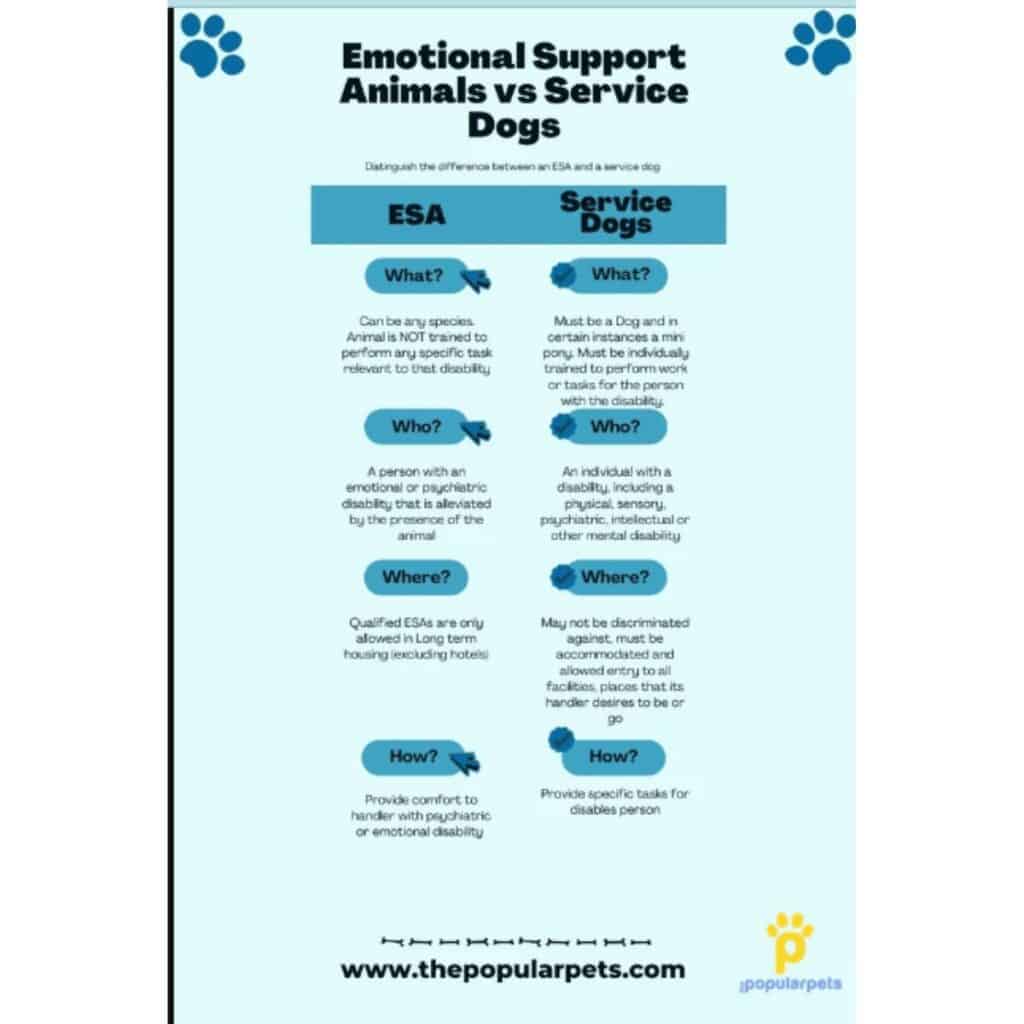Emotional Support Animals (ESA) are capable of making their owners feel better and happier. They can provide owners with emotional support and can boost their spirits when they’re feeling low. Emotional Support Animals can be of great benefit to those suffering from stress, anxiety, and other mental conditions.

What is an Emotional Support Animal?
An Emotional Support animal is any type of animal whose owner derives a sense of well-being and safety, or calm from its companionship and presence. Any animal can be an emotional support animal as long as its presence provides comfort and support that helps its owner cope with or reduce symptoms of an emotional or mental disability.
The FHA defines emotional support dogs as an animal that provides emotional support that alleviates one or more identified effects of a person’s disability.
Emotional Support Animal vs Service Animal
While Emotional support animals are often used as part of a medical treatment plan, they are not considered service animals under the Americans with Disabilities Act (ADA). For more on service dogs check out our Ultimate Guide to service Dogs.
Emotional support animals by their definition have not been trained to perform a specific job or task therefore they do not qualify as service animals under the ADA.
Emotional support animals have only limited access to certain public places where service dogs are allowed. The Federal Housing Administration (FHA) protects the housing right of ESAs and allows them to live with the owner in apartments and other “No Pets” accommodations.
There are many differences between ESAs and service dogs we contrasted and compared the differences here.

Psychiatric Service Dog vs Emotional Support Dog
It may be confusing to some since a “Psychiatric service dog” means a dog that is trained to do work or a task, just for a person with a psychiatric disability. But unlike an emotional support dog psychiatric service dogs do have rights under the ADA since they are not the same as emotional support dogs.
What disabilities or disorders qualify you as an emotional support animal owner or handler?
Emotional Support Animals can help with a wide range of conditions, if you experience any of the following and your animal supports you with the condition you may qualify as an ESA owner:
- Anxiety
- Bipolar disorder
- PTSD
- Agoraphobia
- Postpartum depression
- Learning disorders
- Attention Deficit Disorder (ADD)
- Sexual disorder
- Mental retardation
- Motor skills disorders
- Substance-related disorder (alcohol and/or drugs, among others)
- Cognitive disorders
How to qualify for an emotional support animal?
If you have an emotional disability, health care providers and even social workers can recommend use of an ESA as potentially helpful to a patient or client and provide an emotional support dog (or other animal) letter to that effect.
This requires a finding of an emotional or psychological disability, and is part of the person’s permanent record, which can affect them in a variety of ways. Different professions have developed different protocols, and possibly different standards, for when and how to make such a finding.
Owners must train their emotional support animals and ensure that they do not misbehave in public, despite the situation.
Emotional Support Dog Letter or ESA Letter
An ESA letter is a legal document that proves your animal is an ESA. This document must include the name of your diagnosed condition(s) and a recommendation for an ESA.
You may be asking how do you write an ESA and people are looking for an emotional support dog letter sample but in reality no health care practitioner letter will be the same. However, since you cannot write your ESA yourself you will need to direct your health care practitioner to prepare a letter which satisfies the information that you need to provide your Landlord, property management company or HOA or other party.
Your health care practitioner may find it helpful if you provide them with a template that identifies your needs.
Remember the ESA letter has to be on their letterhead and be no more than one year old.
Emotional Support Animal Training
Unlike Service dogs, ESA’s are not required to be trained to perform a service for their owners. An ESA provides emotional support for their handlers and can qualify as long as the animal does not cause a disturbance or undue hardship for a property owner.

Emotional Support Dogs and Housing
HOAs, landlords, and those in a similar role who are covered by the Fair Housing Act, certain other federal laws, or equivalent state laws, must allow service dogs and ESAs in housing (in California, only landlords renting 1 room in their own dwelling are exempt).
Animal Owners seeking the housing for themselves and their ESA can be required to provide documentation of need (but not to disclose details of their disability/ies) in the form of a letter from a healthcare provider.

Property owners, Landlords and HOAs can only exclude emotional support animals on an individual basis, when they are unreasonably destructive or disruptive and efforts to accommodate them have failed or are obviously futile.
Can Emotional Support Dogs Go On Airplanes?
Service dogs and Air Travel with Service Dogs are very different from emotional support dogs. Airlines accommodate service dogs on flights. Airlines may require 48 hour prior notice, documentation of dog’s health, behavior, and training.
The Department of Transportation revised its rule related to ESA’s December 2020, removing ESAs from coverage among other changes.
In March 2021, the US Department of Transportation gave a new ruling that says that airlines can decide whether or not they allow emotional support animals on their flights. With this new ruling, most airlines have chosen not to accept emotional support animals. Now, passengers are required to pay a pet fee in order to bring their emotional support animals into the cabin with them. This includes dogs, cats, and other pets.

Most domestic airlines including United Airlines, American Airline, Jetblue, Frontier, Alaska, and Southwest have decided to stop accepting ESAs in the airline cabin.
What airlines allow emotional support dogs?
There are still plenty of airlines where ESAs are permitted and it’s extremely useful for air travel outside of the U.S. Here is a list of common airlines that you can leverage ESA status and bring your ESA dog with you on:
- Latam Airlines
- Volaris
- Westjet
- Air France
- China Airlines
- Asiana Air (Flights from/to the United States. Rules will change.)
- KLM (Emotional support dog only, from 4 months and older)
- Lufthansa (Flights from/to the United States. ESA’s up to 8 kgs)
- Singapore Air (Emotional support dog only, from 4 months and older)
When bringing emotional support animals onto airlines that accept ESA’s, you should always make sure you have the proper documentation. Always bring with you the ESA letter and keep a copy of the ESA letter on your phone and of course ensure that your dog or animal has any other health certifications required by the departure and arrival country and the airlines.
Can emotional support dogs go in stores?
Contrary to popular belief, emotional support dogs or animals are not generally allowed in stores that have a no pet policy. Emotional support animals don’t have the same level of public access as service dogs. Each store owner has the right to accept or deny an ESA. Some store owners allow ESAs as a courtesy, but it is within their right to refuse to accommodate them.

Can Emotional support dogs go to hotels?
Almost all pet-friendly hotels accept ESAs and are willing to provide you and your ESA with acceptable accommodation unless the pet is aggressive and harmful to people and furniture. Generally, ESAs are not allowed in non-pet-friendly hotels. Hotels are distinguished from housing that is covered under the FHA since they are used for temporary lodging rather than long term housing.
Many hotels will allow your ESA to stay with you if you politely state your situation and the status of the ESA. Some hotels may charge additional fees for pet products or housekeeping, depending on their pet policy.
It is recommended that you make your specific request via email or phone before booking a room. It’s very helpful to submit a legitimate ESA letter from a licensed mental health therapist.
Emotional Support Dogs at Work or Your Place of Employment
There is no federal law that mandates employers to accommodate emotional support animals. Generally, employers do not allow emotional support animals to accompany their owners in the workplace.

Your employer, however, may have a different policy that accepts ESAs if certain conditions are met. It may be worthwhile to discuss what options you have with your manager or supervisor. Fair warning, most employers do not have a policy that allows for ESAs during working hours.
Federal Laws Applicable to Emotional Support Animals
Americans with Disabilities Act of 1990 (42 U.S.C. sec. 12101 et seq.) (“the ADA”) and enabling regulations (by DOJ) covers public assess.
Employment & school coverage limited. Fair Housing Act of 1968 (Title VIII of the Civil Rights Act of 1968, 42 U.S.C. sec. 3601 et seq.) (“the FHA”) and enabling regulations (by HUD) – Housing (Landlords and HOAs), Rehabilitation Act of 1973 (29 U.S.C. sec. 701 et seq.), Section 504 – Federal Facilities and Federally Funded Programs • Air Carriers Access Act of 1986 (49 U.S.C. sec. 41705 et seq.) (“the ACAA”) and enabling regulations (by DOT) – Commercial Air Travel.
There are many state laws that may also be applicable as well. States cannot be more restrictive than Federal Laws.
Final thoughts on Emotional Support Animals
An ESA can make daily life indescribably better for an individual with a mental or emotional disability. Fortunately, there are federal laws that grant certain rights to ESAs and their owners.
You should feel confident bringing your emotional support animal into your home if you have submitted an ESA letter to your landlord. The law protects ESA owners from discrimination and recognizes that emotional support animals play a crucial role in the battle against mental health disabilities.
Check out more in our Amazing Dogs Series. Dogs that inspire us:
Amazing Dogs Series: 5 Amazing Livestock Guardian Dogs and their Jobs
Amazing Dogs Series: Amazing Jobs- Conservation Detection Dogs Jobs for Conservation Koala Detection
Amazing Dog Series: The Important Dog Job of Cadaver Dogs
Emotional Support Animals FAQs
Yes, anxiety may qualify you for an emotional support animal. Some additional common mental disabilities that qualify someone for an ESA are anxiety, depression, learning disabilities, attention deficit disorder, chronic stress, and post-traumatic stress disorder.
It depends on your situation whether or not it is worth it to get an ESA. ESA do not have as many protections as service animals but they Emotional support animals have been shown to really help people with mental health issues, with individuals citing the benefits that their dogs have on their mental health.
In California, you will need to have a written recommendation for your ESA by a licensed clinical social worker, psychologist, psychiatrist, nurse, or licensed counselor. Your ESA recommendation letter will need to document that your struggle with emotional or mental issues that require you to have your ESA and cannot be older than one year.
Yes, your therapist can write you an ESA letter if they are a licensed clinical social worker, psychologist, psychiatrist, nurse, or licensed counselor.
It is best to have a current ESA to be legitimate that is an ESA that is less than one year old. ESA don’t necessarily expire but you should have a current one with you.

